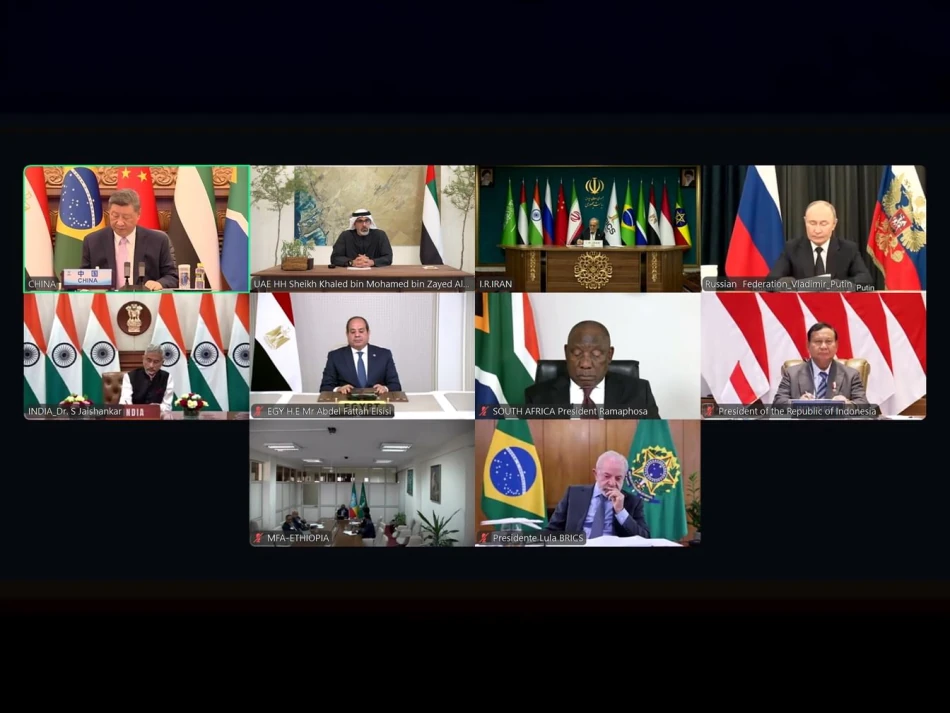
Abu Dhabi Crown Prince represents UAE President at BRICS Virtual Summit
UAE Strengthens BRICS Ties as Middle East Powers Reshape Global Economic Order
The UAE's Crown Prince of Abu Dhabi Sheikh Khaled bin Mohamed bin Zayed Al Nahyan represented the nation at a virtual BRICS summit, signaling the Gulf state's deepening commitment to alternative economic partnerships beyond traditional Western alliances. The summit, hosted by Brazilian President Luiz Inácio Lula da Silva, focused on expanding trade cooperation and digital transformation among the world's emerging economies.
Strategic Pivot Toward Emerging Markets
Speaking on behalf of UAE President Sheikh Mohamed bin Zayed Al Nahyan, the Crown Prince emphasized the importance of BRICS as "an effective framework for international action to achieve development for its countries and peoples." This positioning reflects the UAE's broader strategy of diversifying its economic partnerships as global trade patterns shift away from traditional Western-dominated structures.
The UAE's active participation comes at a critical juncture for BRICS, which has expanded significantly since its original formation. The group now includes major Middle Eastern players like Egypt and Iran alongside the UAE, creating a substantial economic bloc that represents over 40% of the world's population and roughly 25% of global GDP.
Focus on Infrastructure and Digital Integration
The virtual summit prioritized concrete economic cooperation, particularly in infrastructure development, energy projects, and digital transformation initiatives. These areas align perfectly with the UAE's own economic diversification goals and its position as a regional hub for technology and finance.
The emphasis on digital transformation is particularly significant, as it could accelerate the development of alternative payment systems and reduce dependence on traditional banking networks dominated by Western institutions. This mirrors similar initiatives by China and Russia to create independent financial infrastructure.
Geopolitical Implications for Global Trade
The summit's focus on "supporting foreign trade movement between BRICS member states" and addressing "challenges facing the global trade system" suggests growing momentum toward creating parallel economic structures. For the UAE, this represents a calculated hedge against potential future sanctions or trade restrictions while maintaining its role as a global business hub.
High-Level Participation Signals Commitment
The summit brought together major world leaders including Chinese President Xi Jinping, Russian President Vladimir Putin, Egyptian President Abdel Fattah el-Sisi, and Iranian President Masoud Pezeshkian. This level of participation demonstrates the growing importance of BRICS as a counterweight to Western economic institutions.
For investors and multinational corporations, the UAE's deepening BRICS engagement offers both opportunities and challenges. While it opens new markets and partnerships, it also reflects the ongoing fragmentation of the global economy into competing blocs.
Market Implications and Future Outlook
The UAE's BRICS involvement could accelerate the development of alternative trade routes and financial mechanisms, potentially affecting everything from commodity pricing to currency exchange patterns. The country's strategic location between Europe, Asia, and Africa positions it as a crucial link in any new economic architecture that emerges from expanded BRICS cooperation.
This summit builds on the momentum from the 17th BRICS summit held in Rio de Janeiro in July, where the group made significant commitments to economic integration. The UAE's consistent participation suggests it views BRICS not as a temporary diplomatic exercise, but as a fundamental component of its long-term economic strategy in an increasingly multipolar world.
Most Viewed News

 Sara Khaled
Sara Khaled






